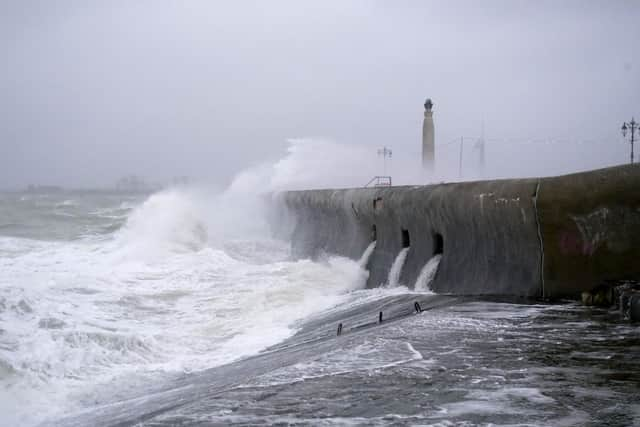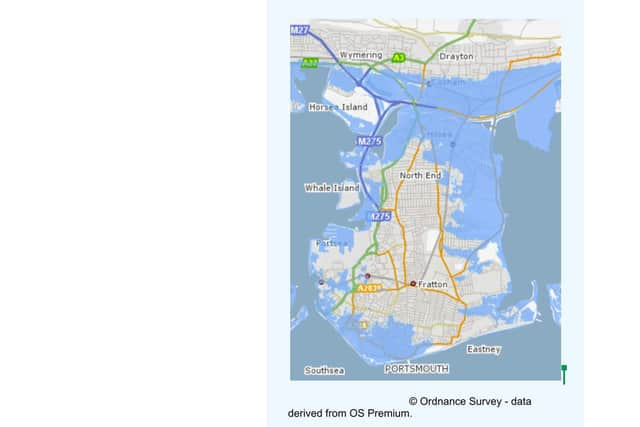How to help the Portsmouth Climate Action Board make the city safer and healthier for years to come
and live on Freeview channel 276
And whether you are an active campaigner, a vocal sceptic or merely apathetic, there’s no denying everyone is aware of some of its causes and consequences.
It is a daunting subject - one that can feel overwhelming when considering its global impact.
Advertisement
Hide AdAdvertisement
Hide AdAs an example of this, the World Economic Forum has reported that temperatures across the world are on average 1.2C warmer than in the 19th century.


And the World Wildlife Fund has stated that global populations of mammals, birds, fish, amphibians and reptiles have declined by 68 per cent, on average, between 1970 and 2016.
But what has this got to do with Portsmouth?
Well - everything. We are not exempt from the effects of climate change, even if so far they have not been as extreme as in other areas.
Actually the city’s unique geography as a flat, island city makes it incredibly vulnerable to these effects.


Advertisement
Hide AdAdvertisement
Hide AdOne of the biggest risks to Portsmouth is rising sea levels. Since 1900 the sea level around the UK has risen by about 16cm. At the current rate of emissions it is predicted the sea surrounding Portsmouth is likely to rise by at least double this amount in the next three decades, and potentially triple it by 2059.
New sea defences across Southsea are currently under construction to protect the city from rising sea levels, but only last month the CEO of the Environment Agency said recent flood events in the UK were now in line with ‘worst case scenarios’. Events that were once regarded as extreme are becoming more common.
For example, Somerset suffered what was dubbed a one in a 100-year flood in both 2012 and 2014. The US city of Houston, in Texas has been hit by three 1 in 500-year flood events in three years.
And then there are our levels of air pollution in Portsmouth, which we all know, are dangerously high - and are thought to contribute to up to 95 deaths in the city a year.


Advertisement
Hide AdAdvertisement
Hide AdSo in response to this all members of Portsmouth City Council unanimously passed a Climate Emergency motion in 2019, which committed them to reducing the local authority and city-wide carbon emissions to net zero by 2030.To help achieve this the council set up a Climate Action Board as an independent body to drive the city’s response to the global climate emergency.
And now the board is ready to launch its community-led schemes and needs the cooperation of residents, business-owners, politicians and schoolchildren alike to make their aims a reality.
The board has three main objectives, as explained by board member Nick Sebley - who also works as a research assistant for the sustainability and environment team at the University of Portsmouth:
Raise awareness of the climate and ecological emergencyWe want to cut through the jargon and get a conversation started about the nature of the problem- our current way of living, travelling and heating our homes- and the solutions available.


Advertisement
Hide AdAdvertisement
Hide AdThis conversation would look at how we can prepare for a more unstable climate, but also most importantly how we can reduce emissions and change our relationship with nature.
There are ways of lowering our carbon emissions that will make our lives healthier, happier and more prosperous. Let’s get talking about that!
Inspire and facilitate climate action in Portsmouth - within all sectors and communitiesTo do this we are launching a website that will act as a hub for climate action, as well as establishing subgroups such as business, faith, and housing to identify barriers to change and brainstorm ways around them.
We are also setting up community groups that we will help green and rewild our city, including planting pocket parks, community orchards and tiny forests in partnership with Hampshire Isle of Wight Wildlife Trust, Portsmouth Friends of the Earth and Portsmouth City Council.
Help develop a Portsmouth Climate Action Strategy
Advertisement
Hide AdAdvertisement
Hide AdThis will be consistent with the Paris Climate Agreement and is built on the views of the city’s residents and stakeholders.


This will be a city-wide initiative in collaboration with the city’s main businesses and organisations.
This is a mid-term goal that will be pursued once Covid restrictions and its financial impacts are more resolved.
Members of the board include representatives in business, education, politics, health, transport and the voluntary sector to make sure every area is considered.
Advertisement
Hide AdAdvertisement
Hide AdBoard chairman, Steve Fletcher, who is director of the sustainability and the environment research theme at the university, explained why the board was needed.
He said: ‘It is an inescapable truth that Portsmouth is at the frontline of climate change in the UK.
‘Portsmouth Climate Action Board is working to identify positive steps individuals, businesses and organisations can take to support climate action. Climate change can often seem scary and impossible to tackle, but we can all make a difference - in ways that often save us money and make us healthier.
‘Meaningful action needs the support of businesses and organisations too, so we are working with these bodies across the city to build a coalition for climate action. I urge everyone to find out more about climate action in Portsmouth through The News and our website.’
Advertisement
Hide AdAdvertisement
Hide AdThe city council’s environment and climate change boss, Councillor Dave Ashmore, is also on the board to represent the local authority.‘The science is clear on climate change,’ he said.
‘Actions are needed to ensure we have a city that is both liveable in and healthy for future generations. There is no one solution to climate change, and no one organisation or person can make the difference that's needed.
‘The role of the Climate Action Board is to co-ordinate a city-wide response to the climate emergency, and it's down to us to ensure that everyone in the city understands the role they can play in tackling climate change.
‘There are changes we can all make, and every change makes a difference. By bringing together individuals and organisations across the city, we will be able to achieve so much more in a shorter time frame, because time is of the essence in an emergency.’
Advertisement
Hide AdAdvertisement
Hide AdSo over the coming week, The News will take an in-depth look into each issue set to be tackled by the board, why it matters in Portsmouth and how we can each play our own part - no matter how large or small your individual contribution.
To find out more about the work of the Climate Action Board visit their website portsmouthclimateaction.org.uk or email them at [email protected].
What are the risks of climate change in Portsmouth?FloodsThe new sea defences in North Portsea are designed to withstand a one in 500-year flood event, and the planned Southsea defences are designed to provide protection against a one in 200-year flood event until 2115.
Unfortunately, climate change makes flooding predictions incredibly difficult.
Advertisement
Hide AdAdvertisement
Hide AdThe overtopping of waves, heavy rain and storm events can cause even the most robust defences to fail.
We are already seeing more frequent and powerful storms; the UK has experienced a major flood almost every year since 2007. These intense storms could strike the UK with increasing frequency in the future, a one in 100-year flood event could become a 1 in 50-year flood event if we do not reduce our carbon emissions.
While the rising sea level is one of the most noticeable threats, rainfall can cause similarly damaging flood events. According to the Met Office, since 2010 both summers and winters in the UK are over 12 per cent wetter; compared to the 1961-1990 period.
And because warmer air holds more water vapour the rainfall in Portsmouth will continue to increase, however, this will not be gradual or evenly distributed across the month. It is expected that shorter heavier events of rain will increase the risk of flash floods; by 2050 the intensity of rainfall is expected to increase by up to 20 per cent. Despite the precautions and work implemented by Portsmouth City Council and Southern Water, the low topography of Portsmouth makes surface water flooding a particular issue.Given the concentrated nature of the city, the immediate cost of a flood event here could be devastating. Businesses and homes could be destroyed while supply chains in and out of the city, and the ability of workers to enter and leave the city, could be affected for some time afterwards. Even after the initial destruction the residual risk of flooding would impact the value of homes and businesses.
Advertisement
Hide AdAdvertisement
Hide AdExtreme heatThere is also the concern that temperatures will continue to rise. The Met Office has reported that the UK’s 10 hottest years on record have all happened since 2002. Days of extreme heat in south east England have also risen from once every 1,000 days to as often as once every 200 days.
The increase in temperature is continuing, with 2019 recording both the highest summer temperature (38.7C) and winter temperature (21.2C) on record.
Portsmouth's dense urban environment is particularly susceptible to increased levels of heat, this is because of the urban heat island effect. The centre of a built urban area can be several degrees warmer than the surrounding rural areas.
This additional heat is caused by a combination of human activity and the presence of buildings in close proximity. The lack of green space and canopy cover means that heat from the sun is more readily absorbed by the urban fabric; like concrete, tarmac and stone. These factors combined contribute to the urban heat island effect and therefore increased temperatures in cities like Portsmouth.
Key terms
Advertisement
Hide AdAdvertisement
Hide AdCO2e: Carbon dioxide equivalent. Human activity results in emissions of a range of greenhouse gases: carbon dioxide is the main one but there is also methane, nitrous dioxide and CFCs. These have different warming potentials and last in the atmosphere for different periods of time. Co2e is arrived at through a formula that allows these other greenhouse gases to be converted into the warming potential of carbon dioxide.
Net zero or carbon neutral: A state whereby we do not emit more CO2e than we can remove from the air. In practice this means reducing emissions to as close to zero as possible, and then using technology and plants to capture and store the remaining emissions. However, carbon capture and storage technology is currently unproven at scale. It is the city council’s goal to reach net zero by 2030.Climate emergency: Globally emissions are 65 per cent higher than in 1990, and are still rising. The impact of our cumulative emissions is that since the 1980s, each decade is increasingly hotter than one before: indeed 19 of the last 20 years are the hottest in recorded history. Likewise February 2020 was the wettest winter on record in the UK. The UN has said we, collectively, have nine years to halve our emissions or risk these temperature rises unleashing processes we can not stop.
Comment Guidelines
National World encourages reader discussion on our stories. User feedback, insights and back-and-forth exchanges add a rich layer of context to reporting. Please review our Community Guidelines before commenting.